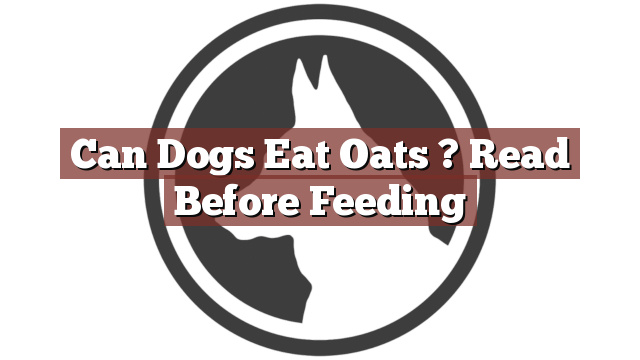Understanding Your Dog’s Dietary Needs
As a responsible dog owner, it is crucial to understand the dietary needs of your furry companion. Just like humans, dogs require a balanced diet to maintain optimal health. While dogs are primarily carnivores, their digestive system is adaptable enough to process certain plant-based foods as well. However, it is essential to be cautious when introducing new foods into their diet to ensure they are safe and beneficial for their overall well-being.
Can Dogs Eat Oats? Read Before Feeding
Can dogs eat oats? This is a common question that many dog owners ask. The answer is yes, dogs can eat oats in moderation. Oats are a nutritious whole grain that can provide several health benefits for your furry friend. They are a great source of dietary fiber, protein, vitamins, and minerals. Oats are also low in fat and cholesterol, making them an excellent choice for dogs who may be overweight or have certain health conditions.
However, it is important to note that not all dogs can tolerate oats. Some dogs may have grain allergies or sensitivities, which can cause digestive issues or skin problems. If you are considering adding oats to your dog’s diet, it is best to consult with your veterinarian first to ensure it is safe for your specific dog.
Pros and Cons of Feeding Oats to Your Dog
Feeding oats to your dog can have several benefits. One of the main advantages is that oats are a great source of dietary fiber, promoting healthy digestion and reducing the risk of constipation. The fiber content in oats can also help regulate blood sugar levels, making it a suitable option for dogs with diabetes or those at risk of developing the disease.
Additionally, oats contain essential nutrients such as iron, magnesium, and B vitamins, which can contribute to your dog’s overall health. These nutrients support a strong immune system, promote healthy skin and coat, and aid in proper muscle and nerve function. Oats are also a good source of antioxidants, which can help combat free radicals and reduce inflammation in your dog’s body.
However, it is crucial to consider the potential drawbacks of feeding oats to your dog. Some dogs may have difficulty digesting grains, leading to gastrointestinal upset or allergic reactions. If you notice any adverse symptoms such as vomiting, diarrhea, or skin irritations after introducing oats into your dog’s diet, it is recommended to discontinue their consumption and consult with your veterinarian.
In Conclusion: Consider Your Dog’s Needs Before Adding Oats to Their Diet
In conclusion, while oats can be a nutritious addition to your dog’s diet, it is vital to consider their individual needs and any potential allergies or sensitivities they may have. Before introducing oats or any new food into your dog’s diet, consult with your veterinarian to ensure it is safe and suitable for them. Remember to start with small portions and monitor your dog for any adverse reactions. Providing a balanced and wholesome diet is a key aspect of ensuring your dog’s overall well-being and longevity.
Thank you for taking the time to read through our exploration of [page_title]. As every dog lover knows, our furry friends have unique dietary needs and responses, often varying from one canine to another. This is why it's paramount to approach any changes in their diet with caution and knowledge.
Before introducing any new treats or making alterations to your dog's diet based on our insights, it's crucial to consult with a veterinarian about [page_title]. Their expertise ensures that the choices you make are well-suited to your particular pet's health and well-being.
Even seemingly harmless foods can sometimes lead to allergic reactions or digestive issues, which is why monitoring your dog after introducing any new food item is essential.
The content provided here on [page_title] is crafted with care, thorough research, and a genuine love for dogs. Nevertheless, it serves as a general guideline and should not be considered a substitute for professional veterinary advice.
Always prioritize the expert insights of your veterinarian, and remember that the health and happiness of your furry companion come first.
May your journey with your pet continue to be filled with joy, love, and safe culinary adventures. Happy reading, and even happier snacking for your canine friend!

